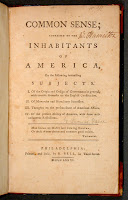This day belongs to Caesar and Thomas
Paine
 |
| Julius Caesar |
In 49 BC, supposedly on 10th January of the Roman Calendar, Gaius
Julius Caesar led one legion, the Legio XIII Gemina, south over the Rubicon
from Cisalpine Gaul to Italy to make his way to Rome. In doing so, he
(deliberately) broke the law on imperium and made armed conflict
inevitable. According to the historian Suetonius, Caesar uttered the famous
phrase Alea iacta est ("the die has been cast").
Common Sense is a pamphlet
written by Thomas Paine.
 |
| Paine |
It was first published anonymously on 10th January 1776, at the beginning of the American
Revolution. Common Sense was signed "Written by an
Englishman", and it became an immediate success. In relative proportion to
the population of the colonies at that time, it had the largest sale and
circulation of any book published in American history. Common Sense
presented the American colonists with an argument for freedom from British rule
at a time when the question of seeking independence was still undecided. Paine
wrote and reasoned in a style that common people understood. Forgoing the
philosophical and Latin references used by Enlightenment era writers, he
structured Common Sense as if it were a sermon, and relied on Biblical
references to make his case to the people. He connected independence with
common dissenting Protestant beliefs as a means to present a distinctly
American political identity. A good example of strategic performance writing. Historian Gordon S. Wood described Common Sense
as "the most incendiary and popular pamphlet of the entire revolutionary
era". Thomas Paine might have
remarked on the publication of Common Sense
Alea iacta est.

No comments:
Post a Comment